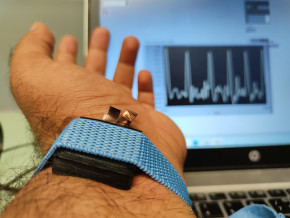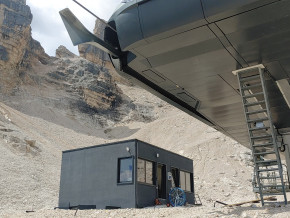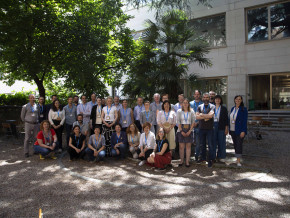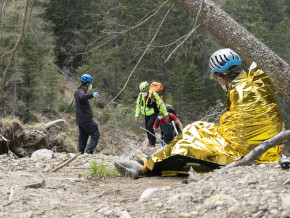Seeing Cells in All Their Dimensions
Teaming up with the company Micro Photon Devices from Bolzano/Bozen, Eurac Research has developed a new confocal microscope that allows scientists to observe cellular biological processes with greater speed and precision.
In the field of bioimaging, biological objects are studied with the help of optics, electronics and informatics—technologies that are in widespread use in biology and medicine today.
In 2014, Eurac Research obtained its first confocal microscope, an essential bioimaging tool. Not unlike computer tomography, which produces sectional views of the body, the confocal microscope uses laser technology to make slice-by-slice scans of cell or tissue cross sections.
Reconstructing the slices afterwards on a computer screen produces 3D images of the cells that can be viewed from any angle and analysed using image analysis software. If proteins are marked with colored fluorescent markers, researchers can observe biological processes—normal or pathological—in the cell. This can be done both in fixed and in live cells, producing both still and video images.
Eurac Research’s confocal microscope, a top-of-the-line unit, is a modular setup that was recently upgraded to meet the evolving research needs. Working closely with a group of physicists and engineers from the University of Cambridge, the Politecnico di Milano as well as the Bolzano/Bozen company Micro Photon Devices, the neurobiologist Alexandros Lavdas from Eurac Research was responsible for adding a new sensor to the microscope, to create a prototype with increased functionality through the use of Fluorescence Lifetime Imaging (FLIM). This technique allows researchers to peek into biochemical processes inside the cell. There are commercially available FLIM solutions, but the Eurac Research setup represents an advancement in speed and sensitivity over other systems.
Related Articles

Tecno-prodotti. Creati nuovi sensori triboelettrici nel laboratorio di sensoristica al NOI Techpark
I wearable sono dispositivi ormai imprescindibili nel settore sanitario e sportivo: un mercato in crescita a livello globale che ha bisogno di fonti di energia alternative e sensori affidabili, economici e sostenibili. Il laboratorio Sensing Technologies Lab della Libera Università di Bolzano (unibz) al Parco Tecnologico NOI Techpark ha realizzato un prototipo di dispositivo indossabile autoalimentato che soddisfa tutti questi requisiti. Un progetto nato grazie alla collaborazione con il Center for Sensing Solutions di Eurac Research e l’Advanced Technology Institute dell’Università del Surrey.

unibz forscht an technologischen Lösungen zur Erhaltung des Permafrostes in den Dolomiten
Wie kann brüchig gewordener Boden in den Dolomiten gekühlt und damit gesichert werden? Am Samstag, den 9. September fand in Cortina d'Ampezzo an der Bergstation der Sesselbahn Pian Ra Valles Bus Tofana die Präsentation des Projekts „Rescue Permafrost " statt. Ein Projekt, das in Zusammenarbeit mit Fachleuten für nachhaltiges Design, darunter einem Forschungsteam für Umweltphysik der unibz, entwickelt wurde. Das gemeinsame Ziel: das gefährliche Auftauen des Permafrosts zu verhindern, ein Phänomen, das aufgrund des globalen Klimawandels immer öfter auftritt. Die Freie Universität Bozen hat nun im Rahmen des Forschungsprojekts eine erste dynamische Analyse der Auswirkungen einer technologischen Lösung zur Kühlung der Bodentemperatur durchgeführt.

Gesunde Böden dank Partizipation der Bevölkerung: unibz koordiniert Citizen-Science-Projekt ECHO
Die Citizen-Science-Initiative „ECHO - Engaging Citizens in soil science: the road to Healthier Soils" zielt darauf ab, das Wissen und das Bewusstsein der EU-Bürger:innen für die Bodengesundheit über deren aktive Einbeziehung in das Projekt zu verbessern. Mit 16 Teilnehmern aus ganz Europa - 10 führenden Universitäten und Forschungszentren, 4 KMU und 2 Stiftungen - wird ECHO 16.500 Standorte in verschiedenen klimatischen und biogeografischen Regionen bewerten, um seine ehrgeizigen Ziele zu erreichen.

Erstversorgung: Drohnen machen den Unterschied
Die Ergebnisse einer Studie von Eurac Research und der Bergrettung Südtirol liegen vor.